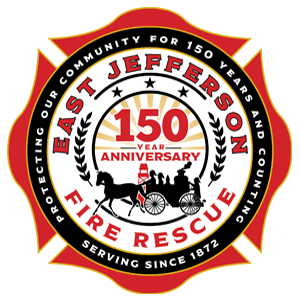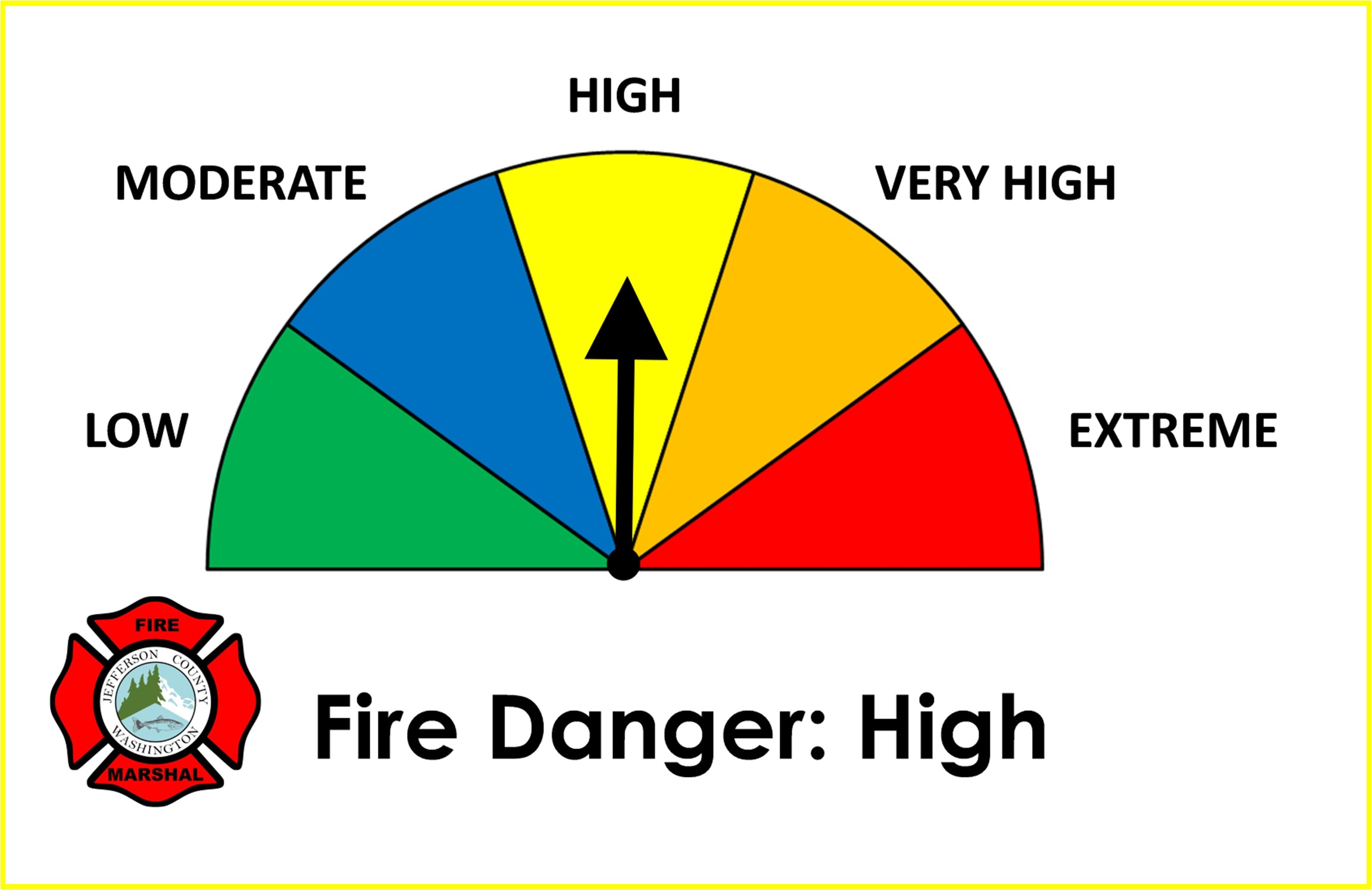CURRENT FIRE DANGER LEVEL
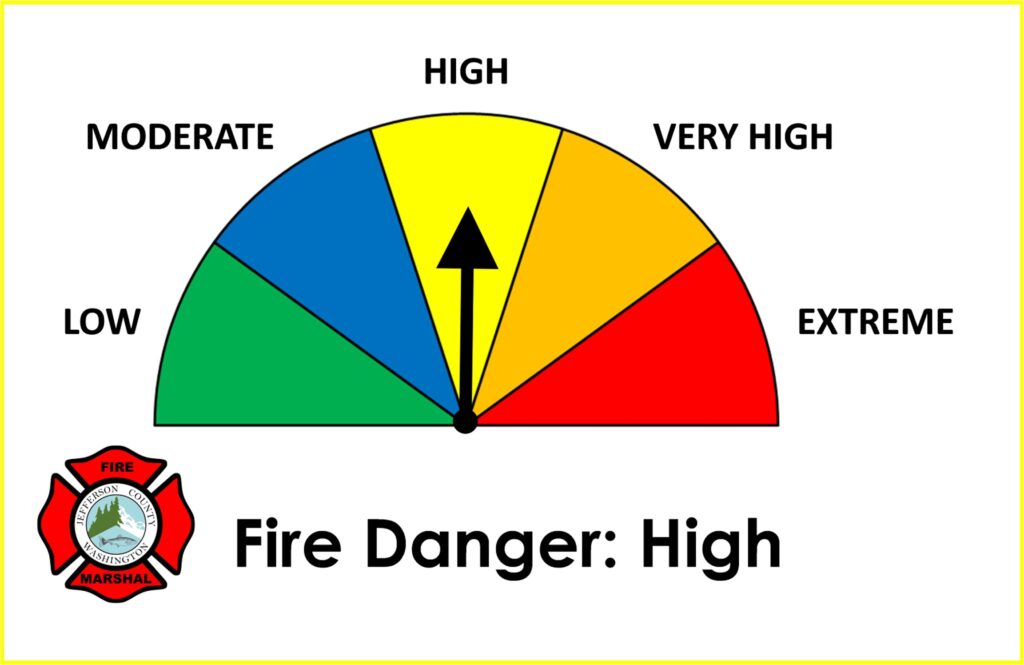
Prohibited: No recreational wood fires; no yard debris or land clearing burning; no open flame wood or charcoal cooking in parks or campgrounds; no open flame devices such as tiki torches, liquid fuel candles, or lanterns; no gas or propane fired weed burners; no discharge of fireworks of any type.
Allowed: Gas or propane fueled appliances; enclosed wood, pellet, charcoal, or solid fuel cooking at a private residence.
Every year, Jefferson County typically restricts burning from July 1st through September 30th. Due to local conditions, burning restrictions began on June 1, 2025, when the Fire Danger Level was elevated to MODERATE. As conditions became drier, the Fire Danger Level was elevated to HIGH on June 25,2025.
In 2024, the Fire Danger Level was raised to MODERATE on July 1st, raised to HIGH on July 10th, raised to VERY HIGH on July 17th. As conditions improved, the level was lowered from VERY HIGH to HIGH on August 28th, lowered to MODERATE on September 17th, and lowered to LOW on October 1st.
2025 Fire Danger Levels and Restrictions
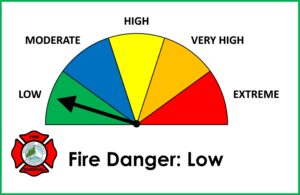
When the fire danger is LOW, fuels do not ignite easily from small embers, but a more intense heat source, such as lightning may start fires in duff or dry rotten wood. Fires in open, dry grasslands may burn easily a few hours after a rain, but most wood fires will spread slowly, creeping or smoldering. Control of fires is generally easy.
Prohibited: No restrictions.
Allowed: Recreational wood fires; yard debris or land clearing burning in unincorporated areas; gas or propane fueled appliances; BBQs; open flame devices such as tiki torches. liquid fuel candles, or lanterns.
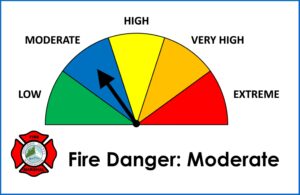
When the fire danger is MODERATE, fires can start from most accidental causes, but the number of fire starts is usually pretty low. If a fire does start in an open, dry grassland, it will burn and spread quickly on windy days. Most wood fires will spread slowly to moderately. Average fire intensity will be moderate except in heavy concentrations of fuel, which may burn hot. Fires are still not likely to become serious and are often easy to control.
Prohibited: No land clearing or yard debris burning; no gas or propane weed burners.
Allowed: Recreational wood fires; gas or propane fueled appliances; BBQs; open flame devices such as tiki torches. liquid fuel candles, or lanterns.
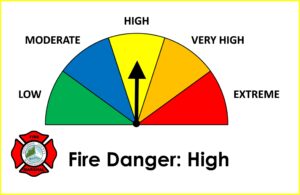
When the fire danger is HIGH, fires can start easily from most causes and small fuels (such as grasses and needles) will ignite readily. Unattended campfires and brush fires are likely to escape. Fires will spread easily, with some areas of high-intensity burning on slopes or concentrated fuels. Fires can become serious and difficult to control unless they are put out while they are still small.
Prohibited: No recreational wood fires; no yard debris or land clearing burning; no open flame wood or charcoal cooking in parks or campgrounds; no open flame devices such as tiki torches, liquid fuel candles, or lanterns; no gas or propane fired weed burners; no discharge of fireworks of any type.
Allowed: Gas or propane fueled appliances; enclosed wood, pellet, charcoal, or solid fuel cooking at a private residence.
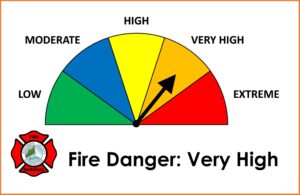
When the fire danger is VERY HIGH, fires will start easily from most causes. The fires will spread rapidly and have a quick increase in intensity, right after ignition. Small fires can quickly become large fires and exhibit extreme fire intensity, such as long-distance spotting and fire whirls. These fires can be difficult to control and will often become much larger and longer-lasting fires. No Outdoor Burning or Discharge of Fire arms. ONLY Gas or Propane Fueled Appliances.
Prohibited: No recreational wood fires; no wood or charcoal cooking; no open flame devices such as tiki torches. liquid fuel candles, or lanterns; no gas or propane fired weed burners; no discharge of fireworks of any type.
Allowed: Gas or propane fueled appliances only.
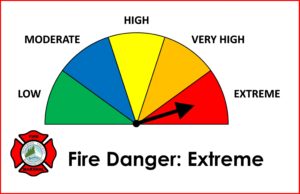
When the fire danger is EXTREME, fires of all types start quickly and burn intensely. All fires are potentially serious and can spread very quickly with intense burning. Small fires become big fires much faster than at the VERY HIGH level. Spot fires are probable, with long-distance spotting likely. These fires are very difficult to fight and may become very dangerous and often last for several days.
Prohibited: All outdoor fires, burning, or discharge of any kind or type.
Northwest Interagency Coordination Center – Seasonal Weather Update
Local Burning Guidelines
EJFR Land Clearing & Burning Policy
EJFR Land Clearing & Burning SOG
Map of the boundaries of the Irondale/Port Hadlock UGA.
For information on the normal burn regulations in our district, click on the PDF below:
For additional information regarding burning status in all Washington state counties:
Burning Alternatives for yard waste via the Olympic Region Clean Air Agency (ORCAA)
